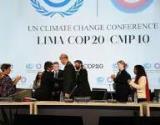Published on Fri, 2014-12-19 10:46
The most important and most fought over outcome of the UN Climate Conference in Lima was a decision adopted by the Conference of the Parties (COP) which the Peruvian Minister in charge of the conference termed ‘The Lima call for climate action’. This COP decision relates to the work of the Durban Platform, which is the track in the UN climate negotiations that leads to an expected new climate change agreement in Paris at the end of 2015. |
Published on Thu, 2014-12-18 22:00
As the international community wades into the political discussions regarding the alternatives to the Millennium Development Goals (MDGs) after 2015 and the design of the Sustainable Development Goals (SDGs) as mandated by the Rio+20 conference, it is timely to consider the question of whether development is a matter mostly of individual effort on the part of nation-states or whether there are elements in the international economic system that could serve as significant obstacles to national development efforts. If there are obstacles in the international economic system, it is important that the post-2015 development agenda and the SDGs address the question of the elimination or the reduction of these obstacles. The limited number of successfully developing countries since the 1950s has provoked a debate over whether the success of these countries required their success in eluding international obstacles to development. The following discussion does not have to take one position or the other. It evaluates features of the international system on the basis of how these features are conducive to enabling long-term investment toward economic diversification. |
Published on Thu, 2014-12-18 19:05
An unapologetic Dutch blogpost by the chair of the Dutch YPFDJ, Meseret Bahlbi, gives an indication of the urgent need for a sober and realistic benchmarking of a process of change in Eritrea, which is heralded in some quarters. The YPFDJ is the youth wing of Eritrea’s only allowed political party. It has an active membership that actively sends out the messages of the party. Unashamedly Bahlbi is expressing the position of Eritrea’s Minister of Foreign Affairs Osman Saleh who called for an urgent review of European migration policies towards Eritreans. According to Minister Saleh these are “to say the least, based on incorrect information”. Bahlbi makes similar claims, suggesting further that his views are vindicated by a recent Danish report. Offering contradictory arguments, this report by the Danish Migration Service suggests returning Eritrean migrants home because of current changes in Eritrea.Human Rights Watch has criticised the report as deeply flawed. Meanwhile the Danish Migration Service has publicly expressed doubts on the content of its report. |
Published on Thu, 2014-12-18 17:41
In 2011, Olivier de Schutter, then UN Special Rapporteur on the Right to Food cautioned, “The commodification of land, which the global phenomenon of land-grabbing is accelerating, entails risks that go far beyond what the current proposals for regulating it seem willing to recognize.” The risks he alluded to stem from treating land, labour and money as mere tradable commodities and allowing market mechanisms to be the sole arbiter of society, culture and nature. Adequately addressing them would require subordinating markets to the interests of society and the natural environment, recognizing non commoditized valuations of land and nature in ‘official’ governance discourse and practice, and putting in place national and international regulations that stop rather than encourage land grabbing. |
Published on Fri, 2014-12-12 21:51
Corporations should be carefully vetted for their fiscal responsibility and human rights record before being allowed to use the UN name and logo or join any partnership with the international organizations, argued Roberto Bissio, from the Social Watch secretariat during a panel on global economic governance on December 11 in New York. Former US congressman Barney Frank, co-author of the Frank-Dodd Act to regulate financial corporations, passed after the 2008 global crisis, was a panel member and agreed with many of the points raised by civil society organizations. The panel also included Chilean Ambassador Eduardo Gálvez, who defended a central role for the UN in global economic governance, an IMF executive director, and representatives of the US Treasury and of the UN Office on Drugs and Crime. |








